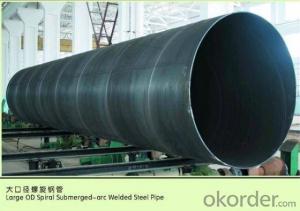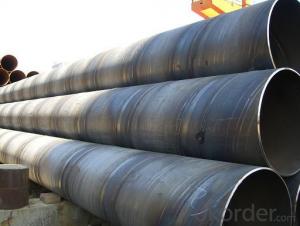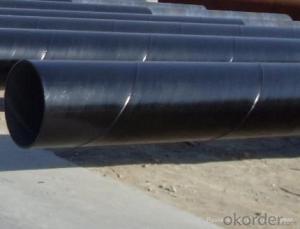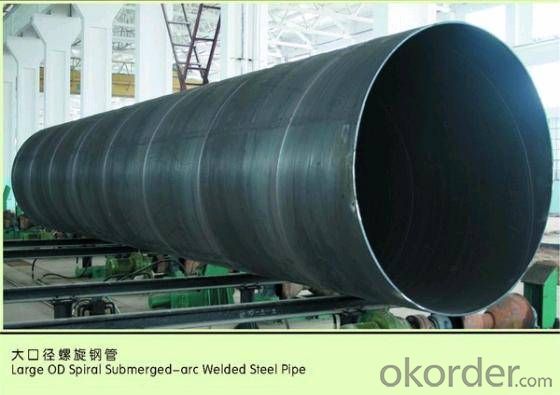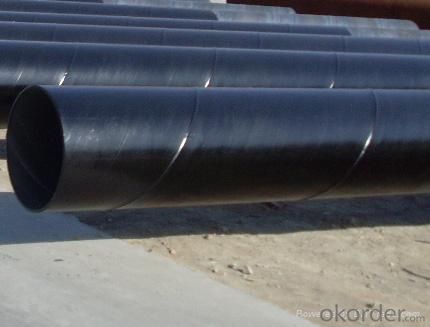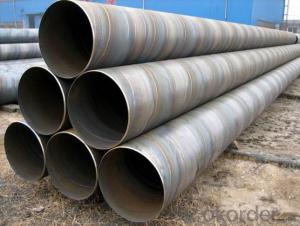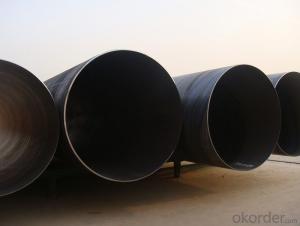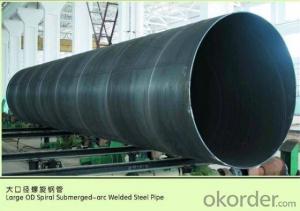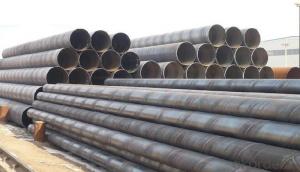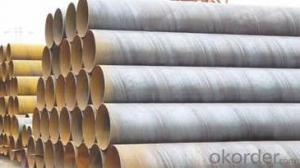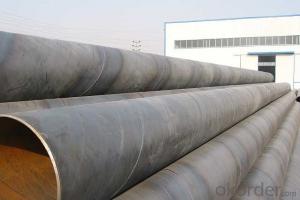SPIRAL STEEL PIPE 60‘‘ ASTM API LARGE DIAMETER PIPE
- Loading Port:
- Tianjin
- Payment Terms:
- TT OR LC
- Min Order Qty:
- 5 m.t.
- Supply Capability:
- 3000 m.t./month
OKorder Service Pledge
OKorder Financial Service
You Might Also Like
Packaging & Delivery
Packaging Detail: | standard export packing or as customer's requirement |
Delivery Detail: | within 10 - 30 days |
Specifications
Spiral Welded Steel Pipes and Tubes
1.Material:Q195-Q235
2.Length:1-12m
3.WT:1.0-14mm
4.O.D.:20-273mm
Spiral Welded Steel Pipes and Tubes
Product Description:
1.Material : Q235,Q345,L245,L290,L360,L415,L450,L485,GrB,X42,46,X52,X56,X60,X65,X70,X80,X100
2,Standard: SY/T5037-2000,GB/T9711-2011,API Spec 5L PSL1/PSL2,ASTM A252\A53,ISO3183,DIN17172,EN10217,JIS G3457,AWWA C200,ASTM A139,ASTM A671,ASTM A672
3.Wall thickness: 3.0mm-30mm
4.Outer diameter: φ168mm-3020mm
5,Length: 5m-12m or as your requirement
6,Corrosion protection standard: DIN30670,DIN30671, AWWAC210, AWWA C203, SY/T0413-2002,SY/T0414-2002
7,Application: Oil, gas, natural gas, water pipe, thermal electricity pipe, steel structure engineering, etc
Q195-q345 Material Steel Pipe's Materials
Elements | Chemical Compsition% | Mechanical Property | ||||||
C% | Mn% | S% | P% | Si% | Yield Point (Mpa) | Tensile Strength(Mpa) | Elongation | |
Q195 | 0.06-0.12 | 0.25-0.50 | <0.050< span=""> | <0.045< span=""> | <0.030< span=""> | >195 | 315-430 | 32-33 |
Q215 | 0.09-0.15 | 0.25-0.55 | <0.05< span=""> | <0.045< span=""> | <0.030< span=""> | >215 | 335-450 | 26-31 |
Q235 | 0.12-0.20 | 0.30-0.70 | <0.045< span=""> | <0.045< span=""> | <0.030< span=""> | >235 | 375-500 | 24-26 |
Q345 | <0.20< span=""> | 1.0-1.6 | <0.040< span=""> | <0.040< span=""> | <0.55< span=""> | >345 | 470-630 | 21-22 |
- Q: Can galvanized steel tubes simmer?
- I make the steel pipe, galvanized pipe and water conveying pipe material is the same, can be bent, specific to what to look at the furnace, can refer to a single material
- Q: Are steel pipes suitable for underground mining operations?
- Yes, steel pipes are suitable for underground mining operations. Steel pipes are known for their durability, strength, and resistance to corrosion, making them ideal for use in harsh underground mining environments. They can withstand high pressure and are capable of transporting various substances, such as water, air, or mining materials, with reliability and efficiency. Additionally, steel pipes can be customized to meet specific mining requirements, ensuring their suitability for underground operations.
- Q: What is the flexibility of steel pipes?
- Steel pipes are known for their exceptional flexibility, making them highly versatile and suitable for a wide range of applications. The flexibility of steel pipes refers to their ability to bend and withstand various forms of stress without breaking or deforming. This flexibility is primarily due to the inherent properties of steel, such as its high tensile strength and ductility. Steel pipes can be bent and formed into different shapes without compromising their structural integrity. This allows for easier installation and routing around obstacles, making them more adaptable for complex plumbing or piping systems. Additionally, the flexibility of steel pipes enables them to withstand external forces, such as ground movements or temperature fluctuations, without experiencing significant damage. The flexibility of steel pipes also makes them suitable for applications that require dynamic movement or expansion. For instance, in oil and gas pipelines or in heating and cooling systems, where temperature variations can cause expansion and contraction, steel pipes are able to accommodate these changes without causing leaks or failures. Furthermore, the flexibility of steel pipes contributes to their durability and longevity. The ability to withstand bending and stress helps prevent the formation of cracks or fractures that can lead to leaks or structural failures. This characteristic makes steel pipes a reliable choice for demanding environments, including high-pressure systems or corrosive conditions. In summary, the flexibility of steel pipes is a crucial attribute that allows for easy installation, adaptability to various conditions, and long-term reliability. With their exceptional flexibility, steel pipes are widely preferred in numerous industries and applications where strength, durability, and versatility are essential.
- Q: How are steel pipes used in the construction of industrial facilities?
- Steel pipes are commonly used in the construction of industrial facilities for various purposes such as transporting fluids, gases, and steam, as well as providing structural support and carrying electrical wiring. They are durable, resistant to corrosion, and can withstand high pressure and temperature, making them ideal for industrial settings.
- Q: How are steel pipes tested for quality control?
- Steel pipes are tested for quality control through various methods such as visual inspection, dimensional checks, non-destructive testing, and mechanical testing. These tests ensure that the pipes meet the required standards and specifications, ensuring their structural integrity and performance.
- Q: Are the welded and galvanized tubes the same weight?
- There should be no difference in the weight of the same specifications for the welded pipe and galvanized pipe. The slight difference is that the galvanized pipe should be pickled before galvanizing and must digest some iron and then galvanized. The difference depends on the difference in the process. So the theoretical calculations are the same.
- Q: Can steel pipes be used for underground geothermal systems?
- Indeed, underground geothermal systems can utilize steel pipes. Given their robustness and longevity, steel pipes are frequently employed in geothermal systems. They can endure the elevated temperatures and pressures inherent in the extraction and distribution of geothermal energy. Moreover, steel pipes exhibit excellent resistance to corrosion, a crucial attribute when contending with the subterranean milieu and the diverse array of minerals and chemicals present in the soil. Furthermore, steel pipes possess versatility, enabling straightforward underground installation and connection, rendering them a fitting selection for geothermal systems.
- Q: What are the different types of steel pipe supports for high-temperature applications?
- Some different types of steel pipe supports for high-temperature applications include hangers, clamps, brackets, and anchors. These supports are designed to withstand the elevated temperatures and provide stability and proper alignment to the piping system.
- Q: What are the different types of steel pipe valves?
- Various industries and applications commonly utilize several types of steel pipe valves. Here, we present some of the most frequently used types: 1. Gate valves: These valves control fluid flow by raising or lowering a gate or wedge that obstructs the flow path. They ensure a tight seal when closed and are prevalent in applications requiring complete shut-off or full flow. 2. Globe valves: With a globe-shaped body and a movable plug or disc, these valves regulate fluid flow. They excel in throttling capabilities and find application in situations demanding precise flow control. 3. Ball valves: Fluid flow is managed by a rotating ball with a hole in these valves. Alignment of the hole with the pipe signifies full openness, while a perpendicular hole indicates closure. Ball valves are durable, reliable, and extensively used in swift and effortless shut-off applications. 4. Check valves: These valves allow fluid flow in only one direction, preventing backflow. They are instrumental in safeguarding pumps, compressors, and other equipment from reverse flow-induced damage. 5. Butterfly valves: Butterfly valves feature a rotating disc within the pipe to control fluid flow. They are lightweight, compact, and provide rapid shut-off. Butterfly valves are commonly employed in large-scale applications like water treatment and HVAC systems. 6. Plug valves: By utilizing a cylindrical or conical plug, plug valves regulate flow within the valve body. Their simple design, ease of operation, and dependable shut-off capabilities make them prevalent in applications requiring frequent operation and high pressure ratings. 7. Diaphragm valves: These valves employ a flexible diaphragm to manage fluid flow. Pressing the diaphragm against the valve seat blocks flow, while lifting it allows flow. Diaphragm valves are frequently used in environments requiring sterility or hygiene. These examples illustrate the variety of steel pipe valves available in the market. The choice of valve depends on specific requirements, including flow rate, pressure, temperature, and the nature of the transported fluid.
- Q: What are the common grades of steel used in pipes?
- The common grades of steel used in pipes include carbon steel, stainless steel, and alloy steel.
Send your message to us
SPIRAL STEEL PIPE 60‘‘ ASTM API LARGE DIAMETER PIPE
- Loading Port:
- Tianjin
- Payment Terms:
- TT OR LC
- Min Order Qty:
- 5 m.t.
- Supply Capability:
- 3000 m.t./month
OKorder Service Pledge
OKorder Financial Service
Similar products
Hot products
Hot Searches
Related keywords
